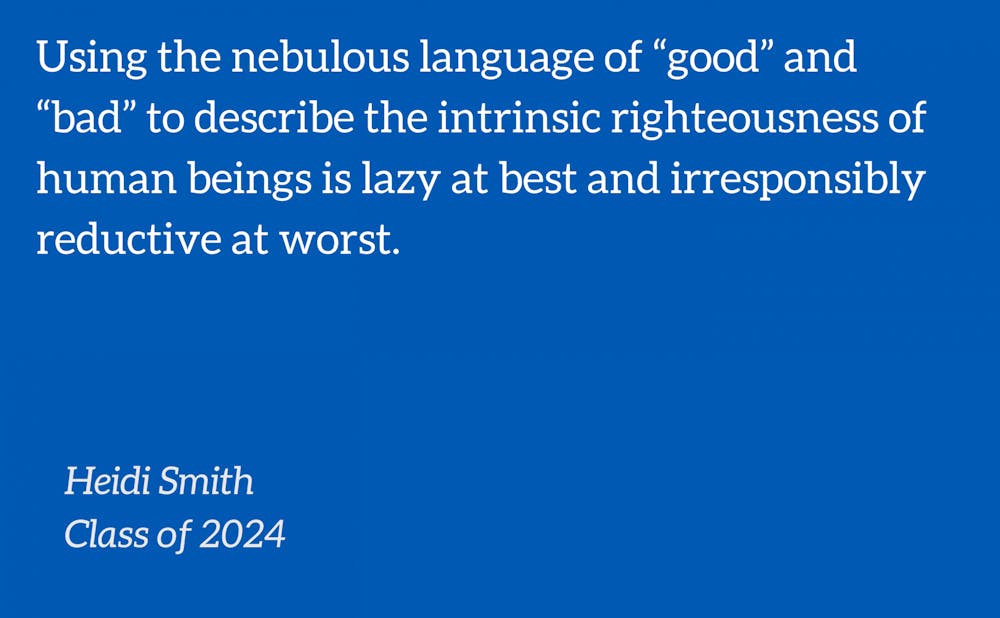While my fellow columnist Dan may see the glass as half full, I cannot help but question the innate goodness of humankind. It is a rather lofty claim either way to speak on the nature of all humans, although if I were forced to choose within the binary, I would probably go with the cynical “people are bad” viewpoint. But it’s not that simple, nor should it be reduced to such confining terms.
I’ll admit, there are clear selfish benefits to doing something good, both internally and externally, but who gets to decide what “good” even means? Certainly not me or another college student. Without a singular agreed upon way to define morals, it is rather difficult to speak on behalf of the entire human race. Using the nebulous language of “good” and “bad” to describe the intrinsic righteousness of human beings is lazy at best and irresponsibly reductive at worst.
For quite a long time I used to think of myself as a good person because I performed actions that society deemed as good. Because I did community service and turned in my homework on time and obeyed the rules, I was good. But to exist as a good person, I had to deem other people bad. Bad because they were more self-centered, bad because they did things I disagreed with, bad because they said things I disagreed with. However I realized that others could just as easily label me as bad and themselves as good for the same reasons when operating within different value systems.
Whether you label people as good or bad is beyond the point; either way, “human nature” becomes a scapegoat for individual responsibility, which is not a good thing. If I am a self-proclaimed “good person,” I can justify doing bad things because they aren’t who I am. Likewise, if I am a “bad person” and I perform bad actions, how can I help it? There’s no point in striving to be good—if that is indeed the goal—when you’ve already made up your mind as to the type of person you are.
Even if we consider most people to be good, somehow bad actions still occur. I’m no economist, but if humans were actually good, wouldn’t they be so regardless of the systems in place, and to that end, wouldn’t they create better, more equitable systems in the first place?
Mr. Reznichenko sees Gofundme as “the ultimate case in point” of the goodness of humans. The fact that Gofundme even needs to exist tells quite a different story. It shows how broken the American healthcare system is, that people have to turn to strangers on the internet to avoid bankruptcy from medical costs. People build systems, and you cannot convince me that good people built the pharmaceutical monopolies, that good people built the insurance companies, that good people decided your life is worth as much as you can afford it to be worth. If people were truly good, Gofundme needn’t exist.
So, I choose to see people as morally ambiguous. Even if someone performs “good” actions, it’s incredibly tricky to deduce whether their intentions are pure. And trickier still to tell whether intentions even matter when evaluating the goodness of an action or of a person. It’s better to be cautious and open-minded than to make a judgment without any additional information. Once an individual has proven themselves with a variety of actions, then perhaps a value judgment can occur. Otherwise, what is the point of prematurely labeling?
I see this tricky paradoxical morality so often back home in the rural Midwest, wherein people eschew Covid guidelines while invoking the word of their god or question the existence of my morals as a nonbeliever and turn around and make bigoted Facebook posts. At Duke too, so many students, myself included, struggle to reconcile the want to make a positive impact on the world with the desire for a high income and the wish to fix systemic problems whilst participating in said problematic systems. Are these people strictly good? Definitely not, but they aren’t strictly bad, either.
Dan implies that the bad people, as opposed to the masses, include politicians and high-level businesspeople. While a valid case can be made for this, again these binary labels do more harm than good. If we say the general populace is good, and these powerful individuals are the bad exceptions, then any bad actions they make simply fulfill our previous cynical expectations. By Dan’s own reasoning, should we not hope for better, and hold them up to the same standard as anyone else instead of giving them a free pass to be bad because it's in their nature?
If we see people as neutral, individual actors, able to perform deeds with varying levels of morality, it becomes less a matter of identity and more a personal goal to better embody whichever values you subscribe to. We should start with a blank slate, proving how good or bad we are every day by choosing the actions that are most personally important at the moment. Recognizing our own bad deeds leads to greater self reflection about the extent to which we actually act in line with our values. Thus, being a good person can be a challenge to strive for, instead of a lazy catchall that allows justification of ambiguously moral deeds.
Heidi Smith is a Trinity sophomore. Her column runs on alternate Wednesdays.
Get The Chronicle straight to your inbox
Signup for our weekly newsletter. Cancel at any time.

